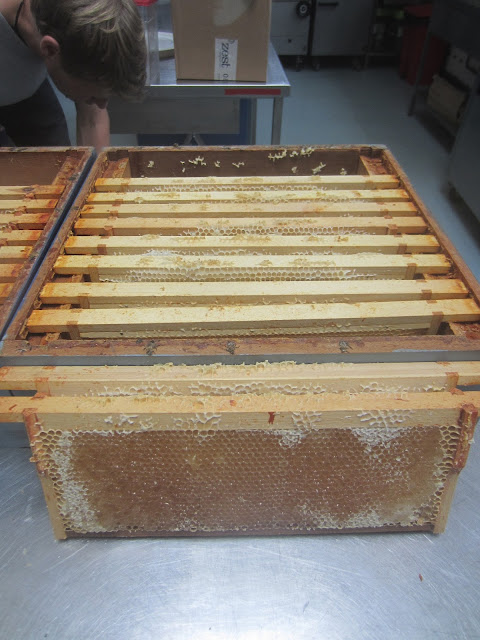A bit later than usual, Goulwenn and I spun out the honey today - or, rather, we tried.
Yesterday I installed the crown boards with porter bee escapes (these fancy sounding things are basically one-way doors, so the bees can leave the supers, but not get back in) underneath the supers, so that harvesting today would be bee-less. I had a few interested pupils come to watch me do this and I talked them through what I was doing. The bees were calm throughout and I came away stingless.
A slightly different story today.
But first things first: we removed two supers from the Moon (the third was as good as empty) and none from the Star, as here there was not enough honey to make a harvest worthwhile. We trussed these up and transported these and all equipment to the kitchen without incident and set up base there, as in previous years.
 |
| All still seemed fine when we uncapped the honey |
We had some difficulty moving the frames around in the new extractor, until we opted for two frames per spin, rather than four. Then all fitted and turned beautifully.
 |
| Working out how to put the frames in |
However, when we set about spinning, no honey was forthcoming. Most of it has crystallized in the comb. Now, with rape this is standard procedure, and indeed some rape cells (recognizable because they are very light, almost white) were obstinate. But a great many other cells, that should have contained 'normal', flowing honey, were also solid.
 |
| Spinning nothing |
 |
| Dead frames with crystallized honey |
So, after carving away at the cappings and spinning till the arm muscles hurt, we actually garnered very little honey - less than in the first year. While naturally disappointed, I guess that's the way it is, when working with nature, rather than mechanized methods of production. Also, the lack of spinnable honey meant we gave it all back to the bees to harvest and store for winter. Hope they can break down the honey and use it.
 |
| Double-filtered honey |
 |
| The first jar (and almost the last!) |
 |
| Scraping out the last bits |
After the harvest, we opened up the crown boards and put feeders on each hive. We also left the supers above the hives, to be cleared, propping the supers open with a pencil, as in past years. We installed a bee gym in the Star, which led to a flood of bees sallying forth and marking me as their victim. I was forced to flee the scene, so aggressive were they. Of course, I was wearing the jacket and I soon had a bee in my back. I changed into the blue suit and that calmed them no end. Somehow, I think the bees don't like the jacket - I have nothing but problems with it.
 |
| Hives closed again and supers to be cleared on top |
We left the bees in scrums to get either into the hive or the supers.








